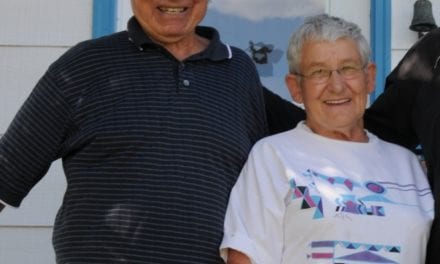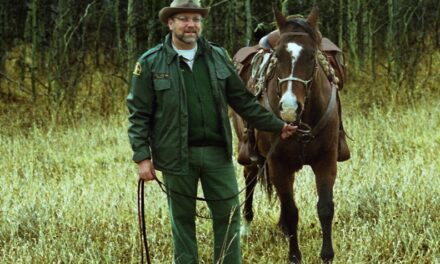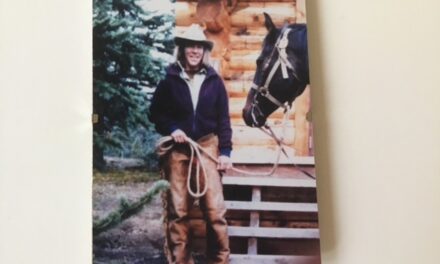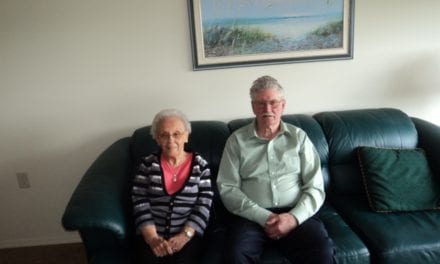(0:54:04) I had horses in Kootenay, and I had horses from the time I was a young boy. We rode to school four miles for 11 years. We also had what we called the acetylene chariot, which was a one horse buggy that we used to drive part of the time. So I grew up with horses and when I was on my dad’s ranch, we had a lot of horses. We had heavy horses as well as light horses because we did all our work with horses back then. We farmed with horses, we put up hay with horses, so I had lots of experience in that vein. I started breaking the saddle horses, when I was about 12 years old, I guess. I still do miss the horses… But the kind of riding they do out here would drive me crazy. They ride around in a little paddock. There is nowhere to go,. I wouldn’t even think about getting too involved with horses out here because as I say, you’ve got to have a place to use them. Trotting around in a little circle is not my cup of tea!
(0:56:05) Well, nobody enjoys the bureaucracy all that much (when asked, “What did you like least about being a warden?”) You put up with it, you learn how it works and you live with it and of course you end up being part of it…ultimately you get involved in a lot of correspondence. When I was in regional office in Calgary there were bear incidents when somebody was injured or killed by a bear. The correspondence…! Well your dad would have known about it in Banff. We got an awful lot of it in regional office and I used to have to cope with a lot of that sort of thing. You know you do it, but it’s not one of your favourite jobs.
(0:57:19) I never liked the media because they never got it right. There would be a fire, or a bear thing, or whatever incident and even when I was in Banff, I usually got dinged for being the spokesman for the Park to talk to the media. You’d talk to them as carefully and as discreetly as you knew how. Then you’d read the item in the paper and you wouldn’t recognize it. So as I say, I disliked that part of the job because sometimes they made you look like an idiot with the stuff they would come out with. They’d take your words out of context and make other inferences and it just never came out right, or it often didn’t come out right.
(0:58:33) One memorable occasion was when I was Superintendent. When I first took over in Pacific Rim, we still had beach camping…cars were running up and down the beach, this sort of thing, you know. I think it was the twenty fourth of May weekend when there was a situation whereby the tides were going to be very high and there was going to be very little space on the beach overnight. We’d had problems in the past with cars getting caught with the tide because there was a very long sloping beach there or a very flat beach. People would go in and leave their car parked and the tide would come up. There was always surf coming up around that beach and the car would start to sink. To this day there are probably pieces of cars that never got off of the beach, that just sunk out of sight. I tried to go to the press to caution people about this limited camping area and I had to go through the regional public relations rep and he was always wanting to dickey up the press release. Anyway the way the thing came out, I got pilloried in the local media because the business people thought I’d driven some of their business away. But we didn’t want a lot of people getting into trouble on the beach. I’ve got a clipping somewhere, “The Superintendent Should Be Fired” dah, dah, dah. You know. That’s one instance of associating with the press that left a bad taste in my mouth.
(1:01:31) I was on the mountain rescue team for several years, three, four, five years I guess. That was back in the days before we had helicopters at our beck and call. Every time we had a rescue it was a job, for seven, eight, ten men, rather than one or two men. I was on a number of rescues/recoveries. In some cases they were just recoveries of bodies. I remember one on Mount Rundle. A man disappeared on Mount Rundle and his car was at the start of the trail and he never came back. It turned out to be a fellow from, I think it was South Africa, somewhere in Africa. We hunted and hunted, climbed up and down that mountain all over the place, trying to find him and never did find him. But he was there, his remains turned up years later.
(1:02:54) I can also recall another rescue on Mount Rundle. It was one of the first uses of a helicopter. Jim Davies was the pilot and I think it was a girl who had fallen into a ravine area up there. We recovered her body and got her to a spot where Jim was able to pick up the body and haul it off. That was my first experience with helicopter assistance. In this case it wasn’t a rescue. It was a recovery.
(1:03:46) There were other instances that I was involved in, but not of huge note. A well known instance involved Billy Vroom and a rescue off the Tower of Babel near Moraine Lake. Bill got to be the warden who tried out the new equipment that we had at that time, which was a cable rescue set. He went down in a seat harness on the end of this cable, to a couple of men. One had broken an arm or a leg or something and they were stranded on the face of the mountain and Bill went down and eventually got them off. But I wasn’t involved in that. I had just moved down east to St. Lawrence Islands at that time. Just missed it and sadly when I moved back, it wasn’t long after that Walter Perren took ill.
(1:05:15) I saw Walter a few times after that and then he was gone. We all loved Walter. He was such a kind, decent man, tremendously capable. He got men who’d never been off the farm up on the face of mountains. He got them to do things they never dreamt they could do. I will always revere Walter’s memory because although his life was cut short, he made a tremendous contribution to the park warden service with particular reference to mountain rescue, avalanche rescue all that kind of stuff. He had grown up with it as a young man in Switzerland…He wasn’t a big man. He was quite short in stature. He was a fantastic rough country skier. He could ski any kind of terrain. Most people can learn how to ski on a packed slope, but Walter could ski in the bush, over the most incredible terrain and he used to get us men to do it too. Not nearly as well as he did, but he took us to some fantastic places. Yes, I always enjoyed skiing. I skied for pleasure quite a lot when we lived in Banff. I used to ski on time off and so on. I wasn’t a great skier, but I got by. I was one of these men, who one way or another I would get down in one piece!
(1:07:37) The biggest change in the warden service over the years was when they went away from the district concept and went to what they called centralization. It was a huge change. It made it much more equitable for the wardens that were married and had families because in a lot of cases it allowed them to get some equity in real estate which was a huge thing, as well as schooling for their kids. When you lived in rental housing for 25 or 30 years, and suddenly got out, by this time the cost of housing had tripled and quadrupled. And you think, “Holy Gosh!” That’s why our move to Calgary…was timely because for the first time ever we were able to get some equity in something that was our own.
(1:08:57) They were starting to upgrade the qualifications for the warden service during the time of centralization. For years they looked for men that could do the backcountry stuff, horse work. You know, men, if they were good skiers, that helped. If they were good mountaineers, that helped. But most wardens early on didn’t have degrees in wildlife management or related sciences and that was changing. It continued to change for quite a while to the point where I can remember having PhD’s apply on seasonal warden competitions. I had a terrible time because personnel would say, how did you possibly fail this candidate? I would say, “Well obviously, he’s over educated.” He’s going to want to become a warden and spend all his time doing research. That’s not what the job is about. “Well, it’s pretty hard not to accept a man with that kind of a background.” I said, “Yes, but there’s other things he needs to be able to do, that he can’t do.” I had lots of battle with personnel over competitions that I sat on…Unfortunately, there was a period there, and it probably still applies, there are people with tremendous educations, but there weren’t the jobs out there. So they were looking wherever they thought they could apply it. Even though it was probably a way lesser job than they should have been working in.
(1:11:18) There’s probably lots of humorous stories related to the warden service. I always think of some of the humorous things that happened with Walter on climbing schools. He used to take us up on a ridge. We did a lot of training in what is called Flints Park which was a branch of the Cascade River. There was one mountain there that was one of Walter’s favourites. The summit of this mountain was a knife ridge and we would traverse it. This knife ridge you looked down on either side and it was almost vertical you know. Some of the men early on, would get down on all fours and almost crawl along. Walter would be out ahead on a rope and he would say, “Stand up boys, you won’t bump your head!” Walter had a great sense of humour in that way. I remember him chastising the men saying “Come on, you can climb that. My mother could lead her milk cow down there!”



